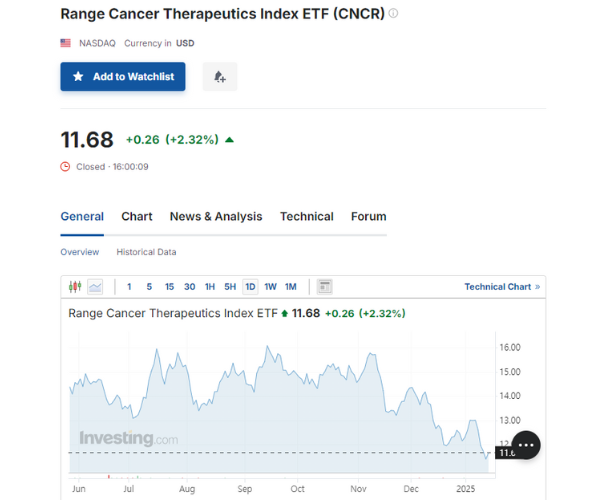
The intersection of finance and medicine has become increasingly significant in the modern era, particularly in the realm of oncology. The CNCR ETF (Range Cancer Therapeutics ETF) exemplifies this dynamic, as it channels investments into groundbreaking cancer research and treatment development. This approach not only provides a promising avenue for investors but also directly contributes to innovations that redefine cancer care.
How CNCR ETF Supports Innovation in Cancer Research
The CNCR ETF is designed to pool capital from investors and allocate it to companies at the forefront of cancer treatment research. This targeted investment strategy has profound implications for accelerating advancements in oncology. For more information about investing in global markets like the CNCR ETF, visit (해외 주식 이벤트).
Key Contributions of the CNCR ETF to Cancer Research
- Funding Pioneering Research
Cancer research is a resource-intensive endeavor, requiring substantial funding for laboratory studies, clinical trials, and drug development. By investing in the CNCR ETF, capital is funneled into companies that are actively working on cutting-edge treatments, such as gene therapy, immunotherapy, and precision medicine. These funds help ensure that promising therapies move swiftly from the research phase to clinical application. - Facilitating Strategic Partnerships
The pooled capital from the CNCR ETF enables biotech firms to engage in strategic collaborations with research institutions, pharmaceutical giants, and technology innovators. These partnerships are critical for combining expertise, sharing resources, and accelerating the development of breakthrough therapies. The ETF acts as a catalyst, empowering companies to push the boundaries of what is possible in cancer care. - Incentivizing Innovation
Companies included in the CNCR ETF portfolio benefit from increased visibility and investor confidence. This financial backing incentivizes firms to invest in high-risk, high-reward projects, such as exploring novel mechanisms of action or targeting rare cancer types. The promise of financial returns encourages sustained innovation, even in areas where traditional funding mechanisms may falter.
Impact on Cancer Treatment Outcomes
The investments driven by the CNCR ETF have a tangible impact on patient care. Some key areas influenced by this financial model include:
- Advancement of Immunotherapy
Immunotherapy has revolutionized cancer treatment, offering new hope for patients with resistant or recurrent cancers. Funds from the ETF contribute to the development of therapies such as CAR T-cell therapy and immune checkpoint inhibitors, which enhance the immune system’s ability to combat cancer cells. - Acceleration of Clinical Trials
A significant portion of ETF investments supports clinical trials, which are crucial for validating the safety and efficacy of new treatments. By expediting this process, patients gain faster access to life-saving therapies. - Enhancing Accessibility
Increased investment in cancer treatment infrastructure, such as manufacturing facilities for biologics and distribution networks, ensures that innovative therapies are accessible to a broader population. The CNCR ETF indirectly facilitates these advancements by strengthening the financial backbone of participating companies.
Financial Benefits for Investors
Beyond its impact on cancer treatment, the CNCR ETF offers compelling opportunities for investors. The biotechnology sector, and oncology in particular, is poised for growth due to the rising global incidence of cancer and the expanding adoption of advanced therapies. Investors benefit from:
- Diversification: The ETF includes a range of companies, from early-stage biotechs to established pharmaceutical firms, reducing risk while maximizing exposure to the oncology sector.
- Growth Potential: As companies achieve breakthroughs and launch successful treatments, their market valuations rise, delivering strong returns to ETF investors.
- Ethical Investing: Supporting cancer research through the CNCR ETF allows investors to align their financial goals with a meaningful cause, contributing to societal betterment.
Conclusion
The CNCR ETF stands as a testament to the transformative power of financial innovation in driving medical progress. By directing investments into cancer research and treatment, this ETF not only offers attractive opportunities for investors but also fuels advancements that improve patient outcomes. From immunotherapy breakthroughs to personalized medicine, the ripple effects of ETF-driven funding are reshaping the landscape of oncology.
For those interested in aligning their investment strategy with the fight against cancer, the CNCR ETF provides a unique and impactful avenue. As the field of oncology continues to evolve, the synergy between finance and medicine promises a future of hope and possibility for countless patients worldwide.